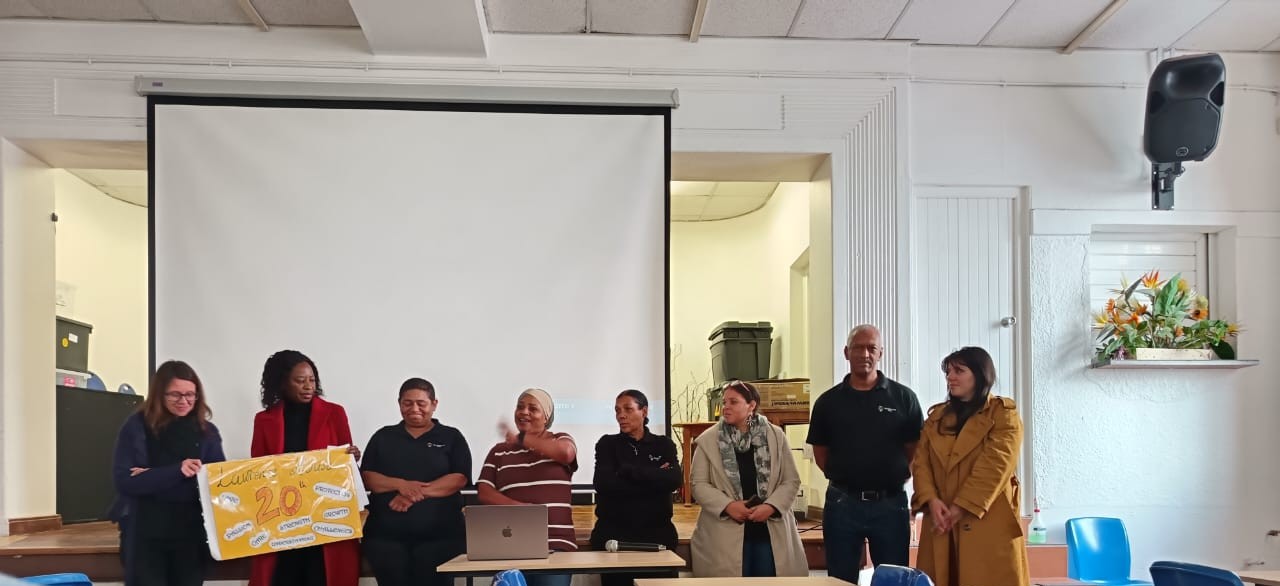
The celebration of St. Scalabrini
The celebration of St. Scalabrini occurs annually on June 1st. Similar to the previous years, the event was hosted at the Scalabrini Center of Cape Town, uniting the various Scalabrini Network of organisations in the city, including the Scalabrini Center of Cape Town, Lawrence House, SIHMA, and the Missionaries of St. Charles Scalabrinian, and totaled over fifty participants. The celebration highlighted the values of St. Scalabrini, which included a dedication to refugees and people experiencing poverty, a cause to which he devoted his life with great fervor.
The celebration began with a speech from Father Peter-John, which included a recollection of the institute’s founding principles, calls to action, and his trademark humor. He explained how the current response from governmental leaders when they face ideological conflict is war and called on the world to be more charitable and loving towards their neighbor as a reflection of St. Scalabrini’s values, juxtaposed with the pursuit of violence, which is far too common in the present day.
Next, the Wellbeing and Development team presented a new program on gender-based violence, which brought to light how societal norms perpetuate gender-based violence and how communities can try to stop the issue by giving more resources and recognition to survivors. Further, the Integration Pathways program provided an overview of their successes this past year. Their main goal is to provide migrants with employment services to help integrate them into society, such as the Employment Help Desk and Skills Hub, a program that provides migrants with tools and resources to develop skills that are required in the South African job market. Another presentation by the advocacy team at the Scalabrini Centre of Cape Town explained the Alternatives to Detention Portfolio (ATD). The ATD Portfolio aims to reduce immigration detention by introducing more rights-based and humane alternatives for migrants, asylum seekers, and refugees through strategies that range from, but are not limited to, legal advocacy to community empowerment. These three presentations outlined new community partners that the centre has created this year, including a new partnership with the United Nations High Commissioner for Refugees (UNHCR).
After the initial presentations, the staff of Lawrence House, an affiliate of Scalabrini, celebrated their 20th anniversary with heartfelt accounts from employees who shared how working with the children in the house had changed their lives. For context, The Lawrence House is a child and youth care center that provides developmental programs for children who exhibit signs of emotional and behavioral difficulties. The Lawrence House shared a documentary that chronicled Neusa’s firsthand experience. Her experience involved separation from her family after her father’s death and the organization’s desperate attempts to reunite Neusa with her mother and siblings. It portrayed the trauma involved with familial separation and how gaps in legal systems can perpetuate this phenomenon. The documentary ended on a happy note, with Neusa being reunited with her family after years of struggle on both sides and showcased the success of the Lawrence House, not only in creating a loving atmosphere but also in providing persistent advocacy and legal counsel.
Lastly, the Scalabrini Institute for Human Mobility in Africa research team facilitated a quiz focusing on African refugee laws and trends, to which most of the crowd participated. The results revealed how even the members of Scalabrini had gaps in their knowledge of how immigration functions across Africa. For example, the country of Niger, which is known for being a transit point for immigrants seeking a new home in other countries, was barely recognized by the participants.
The celebration of St. Scalabrini was a terrific reflection of the successes of the many branches of the Scalabrini Institute in Cape Town, allowing members of the institute to see how their work creates real change across Africa and revealing the importance of the work that Scalabrini conducts.
Photo by SIHMA Media Archives
Categories:
Tags:

